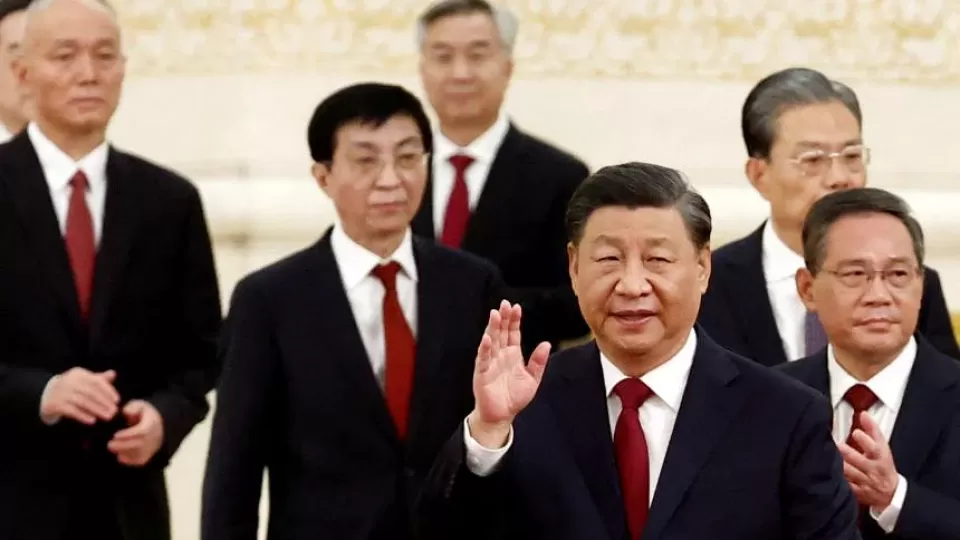October 25, 2022
BEIJING – President Xi Jinping has assumed a rare third term as China’s most powerful leader in decades, defying norms and the factional balance of power by stacking his leadership team with his political allies.
In a clear indication that his domination is now unshakeable, he has installed loyalists in all the four seats vacated by retiring members – including promoting Shanghai party chief Li Qiang, 63, to be his No. 2 and the likely next premier.
Members of the new team filed out into a hall of waiting journalists at the Great Hall of the People on Sunday, with Mr Xi leading the way and later introducing them in order of their rank in the new Politburo Standing Committee, the apex of power.
The major reshuffle will likely see the two returning members – anti-corruption czar Zhao Leji, 65, and ideology chief Wang Huning, 67 – take on new portfolios as chairman of Parliament and head of Parliament’s advisory body respectively.
Besides Shanghai’s Mr Li, the newcomers are Beijing party chief Cai Qi, 66; director of the party’s general office Ding Xuexiang, 60; and Guangdong party chief Li Xi, 66.
Mr Cai will head the party’s secretariat, Mr Ding is likely to be appointed executive vice-premier at next year’s parliamentary session, while Mr Li Xi will be the new anti-corruption chief.
“The new leadership are all ideologically aligned with Xi since all have long working relationships with him that are clearly built on trust and absolute loyalty,” said visiting senior research fellow Drew Thompson from the Lee Kuan Yew School of Public Policy at the National University of Singapore.
“They are not technocrats or ‘reformers’ who will push for liberalising change, or have their own views on how to govern, but instead will be focused on achieving Xi’s political objectives.”
The new leadership line-up points to Mr Xi’s complete supremacy as head of the party.
Mr Li Qiang was installed even though his political fortunes had appeared uncertain, after he came under flak for his handling of the large-scale Covid-19 outbreak in Shanghai this year; he also has never served as a vice-premier, a prerequisite for the premiership.
More telling was the shocking exclusion of vice-premier Hu Chunhua, 59, a competent bureaucrat who had been expected to be promoted to the Standing Committee, despite being from the rival Communist Youth League faction. He has also been left out of the new Politburo, the next-level decision-making body in the party.
With the retirement of Premier Li Keqiang and fourth-ranked Wang Yang, both 67, the new Standing Committee will, for the first time since 1982, have no representation from the rival Youth League faction led by former leader Hu Jintao.
“There are no longer any sort of norms or rules that dictate the promotion of officials, besides Xi’s own personal preferences,” said Associate Professor Victor Shih, an expert in Chinese elite politics at the University of California San Diego.
Besides the elite Standing Committee, Mr Xi has also filled the wider Politburo with loyalists whom he will appoint to key positions to oversee security, foreign policy, economy, the military and propaganda.
For the first time in 25 years, there are no women and ethnic minority representation in the new 24-member Politburo.
Analysts warn that by surrounding himself with loyalists, Mr Xi risks not being able to make any course correction on wrong policies.
“Going forward, any kind of changes on policies that Xi Jinping himself decides on will be extremely incremental, if they happen at all,” said Prof Shih.
But it is also possible that Mr Xi can now concentrate on affairs of the country.
“Now that the core leader has been able to achieve political outcomes that he had hoped for, with no political opposition or challenge, he may be able to focus more on economic and social issues instead of political issues, which has been the case in the past 10 years,” said Associate Professor Li Mingjiang of the S. Rajaratnam School of International Studies.

China’s President Xi Jinping (left) and the members of the new Politburo Standing Committee – Li Xi, Cai Qi, Zhao Leji, Li Qiang, Wang Huning and Ding Xuexiang. PHOTO: REUTERS


